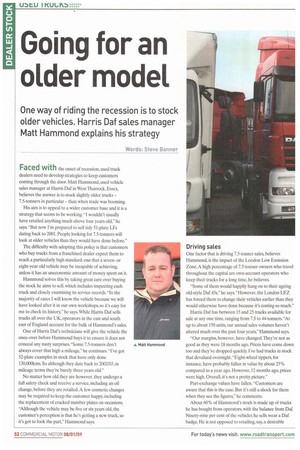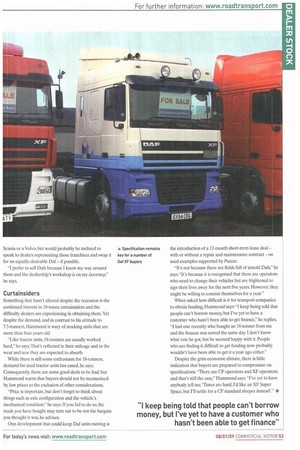Going for an older model
Page 52

Page 53

If you've noticed an error in this article please click here to report it so we can fix it.
One way of riding the recession is to stock older vehicles. Harris Daf sales manager Matt Hammond explains his strategy
Words: Steve Banner Faced with the onset of recession, used truck dealers need to develop strategies to keep customers coming through the door. Matt Hammond, used vehicle sales manager at Harris Daf in West Thurrock, Essex, believes the answer is to stock slightly older trucks 7.5-tonners in particular than when trade was booming.
His aim is to appeal to a wider customer base and it is a strategy that seems to be working. "I wouldn't usually have retailed anything much above four years old,he says. "But now I'm prepared to sell tidy 51-plate LEs dating back to 2001. People looking for 7.5-tonneis will look at older vehicles than they would have done before."
The difficulty with adopting this policy is that customers who buy trucks from a franchised dealer expect them to reach a particularly high standard; one that a sevenor eight-year old vehicle may be incapable of achieving, unless it has an uneconomic amount of money spent on it.
Hammond solves this by taking great care over buying the stock he aims to sell, which includes inspecting each truck and closely examining its service records. "In the majority of cases I will know the vehicle because we will have looked after it in our own workshops, so it's easy for me to check its history" he says. While Harris Daf sells trucks all over the UK, operators in the east and south east of England account for the bulk of Hammond's sales.
One of Harris Dafs technicians will give the vehicle the once-over before Hammond buys it to ensure it does not conceal any nasty surprises. "Some 7.5-tonners don't always cover that high a mileage," he continues. "I've got 52-plate examples in stock that have only done 130,000kms„ So although they date back to 2002/03, in mileage terms they're barely three years old."
No matter how old they are however, they undergo a full safety check and receive a service, including an oil change, before they are retailed. A few cosmetic changes may be required to keep the customer happy, including the replacement of cracked number plates on occasions. "Although the vehicle may be five or six years old, the customer's perception is that he's getting a new truck, so it's got to look the part," Hammond says.
Driving sales
One factor that is driving 7.5-tonner sales, believes Hammond, is the impact of the London Low Emission Zone. A high percentage of 7.5-tonner owners who travel throughout the capital are own-account operators who keep their trucks for a long time, he believes.
"Some of them would happily hang on to their ageing old-style Daf 45s," he says."However, the London LEZ has forced them to change their vehicles earlier than they would otherwise have done because it's costing so much."
Harris Daf has between 15 and 25 trucks available for sale at any one time, ranging from 7.5 to 44-tonners."At up to about 150 units, our annual sales volumes haven't altered much over the past four years," Hammond says.
"Our margins, however, have changed. They're not as good as they were 18 months ago. Prices have come down too and they've dropped quickly. I've had trucks in stock that devalued overnight. "Eight-wheel tippers, for instance, have probably fallen in value by about 25% compared to a year ago. However, 12 months ago, prices were high. Overall, it's not a pretty picture."
Part-exchange values have fallen. "Customers are aware that this is the case. But it's still a shock for them when they see the figures," he comments.
About 60% of Hammond's stock is made up of trucks he has bought from operators, with the balance from Daf. Ninety-nine per cent of the vehicles he sells wear a Daf badge. He is not opposed to retailing, say, a desirable Scania or a Volvo, but would probably be inclined to speak to dealers representing those franchises and swap it for an equally-desirable Daf — if possible.
"I prefer to sell Oafs because I know my way around them and the dealership's workshop is on my doorstep," he says.
Curta insiders
Something that hasn't altered despite the recession is the continued interest in I8-tonne curtainsiders and the difficulty dealers are experiencing in obtaining them. Yet despite the demand, and in contrast to his attitude to 7.5-tonners. Hammond is wary of stocking units that are more than four years old.
"Like tractor units. I8-tonners are usually worked hard," he says. That's reflected in their mileage and in the wear and tear they are expected to absorb.
While there is still some enthusiasm for 18-tonners, demand for used tractor units has eased, he says. Consequently, there are some good deals to be had, but Hammond warns that buyers should not be mesmerised by low prices to the exclusion of other considerations.
"Price is important, but don't forget to think about things such as axle configuration and the vehicle's mechanical condition," he says. If you fail to do so, the truck you have bought may turn out to be not the bargain you thought it was, he advises.
One development that could keep Daf units moving is A. Specification remains the introduction of a I2-month short-term lease deal — key for a number of with or without a repair and maintenance contract on Daf XF buyers used examples supported by Paccar.
"It's not because there are fields full of unsold Dafs," he says. "It's because it is recognised that there are operators who need to change their vehicles but are frightened to sign their lives away for the next five years. However, they might be willing to commit themselves for a year."
When asked how difficult is it for transport companies to obtain funding, Hammond says: "I keep being told that people can't borrow money, but I've yet to have a customer who hasn't been able to get finance," he replies. "I had one recently who bought an 18-toriner from me and the finance was sorted the same day. I don't know what rate he got, but he seemed happy with it. People who are finding it difficult to get funding now probably wouldn't have been able to get it a year ago either."
Despite the grim economic climate, there is little indication that buyers are prepared to compromise on specifications. "There are CF operators and XF operators, and that's still the case," Hammond says."I've yet to have anybody tell me, `Tunes are hard, I'd like an XF Super Space, but I'll settle for a CF standard sleeper instead'," s








































































































































